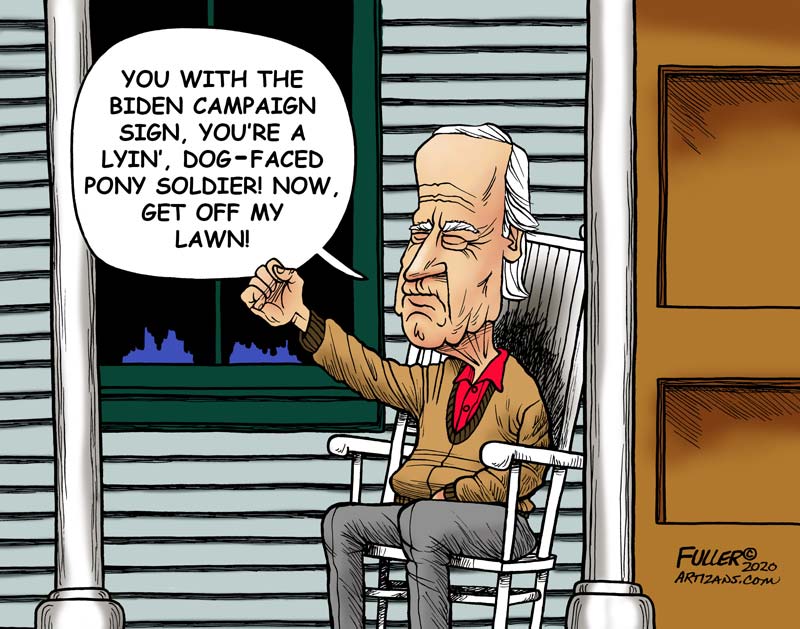
No memos from the desk of Donald J. Trump, no RNC talking points, no right-wing Twitter memes or excoriating floor speeches by Republican senators possibly could have had the effect on Biden of Biden himself selling and defending his Afghanistan policy in terms instantly discredited by unforgettable and horrifying images on the ground this week.
The fate of Biden's presidency might now depend on whether Taliban commanders decide to transform an ongoing evacuation crisis in Kabul into an explicit hostage crisis.
Even if the United States and the president escape that scenario, Biden has done himself long-lasting harm — not for the first-time in his career — with his own spectacularly ill-considered words.
Every president needs credibility, which is absolutely essential to the public trust necessary for political leadership. Biden has gone further, though, and made the telling of inconvenient truths a signature part of his political brand.
A hallmark of his 2020 campaign was his promise to always be a straight-shooter. At the outset of the pandemic, candidate Biden said, "I'll always tell you the truth. This is the responsibility of a president. That's what is owed the American people."
In his inaugural address, he pointedly said that "there is truth and there are lies," and promised to hew unalterably to the former. "I will always," he said, "level with you."
The backdrop, of course, was President Trump, who, in the best of circumstances, was given to boosterish over-statements and, in the post-election period, scattered the political landscape with outlandish falsehoods.
Trump badly crimped his reelection campaign and undermined his coronavirus response with his continuous assurances that the end of the virus was always magically lurking around the corner.
The idea was the Biden would be too experienced, too grounded in reality, too committed to the truth out of principle, too respectful of the American public to paint rosy scenarios to try to gull Americans into an unwarranted optimism.
Then came July 8.
In that now-infamous press conference defending his decision to withdraw troops from Afghanistan, Biden said a Taliban takeover wasn't inevitable.
He said there were "zero" parallels with Vietnam.
He said "there's going to be no circumstance where you see people lifted off the roof of an embassy."
He said the Taliban wasn't "remotely comparable in terms of capability" with the Afghan army.
He said of the Afghan army that we weren't going to "just walk away and not sustain their ability to maintain that force."
He said, "There's not a conclusion that, in fact, they cannot defeat the Taliban."
Arizona 'bracing for impact' of Trump-driven election report Police declare Capitol Hill clear after bomb threat standoff Harris uses convening power to expand her political network Texas drops mask mandate ban enforcement in public schools He disputed a question citing intelligence predicting a rapid collapse of the Afghan government — "that is not true."
And it was all, as Biden put it in his bullying 2012 vice presidential debate with Paul Ryan, malarkey.
It was a farrago of wishful thinking, happy talk, half-truths and blatant deceptions.
It was a justification of alleged foreign-policy realism swathed in delusion and comforting talking points.
Worse for Biden, his July 8 statements weren't countered by a "four Pinocchio" fact-check in the Washington Post, but by pictures and video over the past few days of Taliban flags flying from Kabul, Taliban fighters sitting in the presidential palace and desperate Afghans clinging to a U.S. transport plane — by powerful images that were broadcast across the media landscape, from Fox News to NPR.
Now that the withdrawal is considered a debacle by nearly everyone, government officials are leaking to protecting their interests, and anonymous intelligence officials say their assessments were already quite dire by July. This isn't hard to believe, but whatever the truth, at the very least Biden should have been more guarded on July 8.
He wasn't for a simple reason — it was easier in the moment to accentuate the implausibly positive.
Once Biden had made assurances that didn't come close to bearing out, he could have frankly admitted error, a painful move for any officeholder, but one that is often met with a generous attitude by the American public.
Instead, in his speech about Afghanistan earlier this week, he only confessed that things had moved faster than he had expected, while unconvincingly insisting that his team had planned for every contingency. This, like so much else he has said, has been contradicted by events on the ground. If everything was so carefully planned, why are so many Americans behind enemy lines, and why are we dependent on the good will of the Taliban to allow people into the airport?
Afghanistan, unless it gets much worse, won't kneecap Biden's presidency. The public is ambivalent about the war, and other events will intervene. But the blow to Biden's credibility will remain.
His next big priority, the $3.5 trillion reconciliation bill, is not a modest measure. It is an unprecedentedly large spending bill with unforeseeable consequences. Will people believe Biden's assurances that there will be no downsides to the bill, only wondrous effects, after seeing what became so quickly of his assurances that there would be no downsides in Afghanistan? Will the handful of swing Democrats in the House and the Senate be as willing to follow his public line?
Then, there are crises yet to come. Biden won't be as believable if there's a showdown with Iran or China.
His talk of fearless truth-telling has proved, true to form, to be just talk.
(COMMENT, BELOW)


 Contact The Editor
Contact The Editor
 Articles By This Author
Articles By This Author